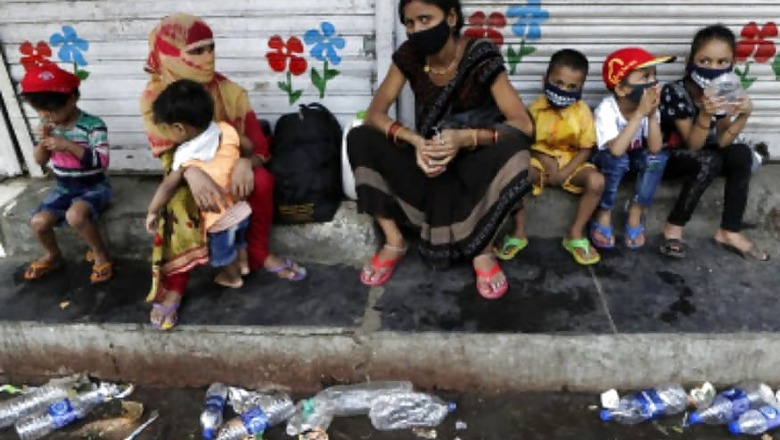
views
Bhopal: Shyambai, a 45-year-old migrant worker who is now back at native village Kota Gunjapur in Panna, stares at an uncertain future due to Covid-19 lockdown which rendered her and teenager son jobless.
Shyambai lost her husband around eight years ago. She had gone to Kanpur in Uttar Pradesh to find employment in construction activities with her son Lokendra, 18, when novel coronavirus struck the nation and lead to countrywide lockdown on March 25.
The employer did not pay her wages and only handed Rs 8,000 for a group of five which included her and her son. With Rs 800 each, the mother-son started the return journey with three others on foot and got a lift from a truck driver who charged Rs 350 each and dropped them for around 200km.
They again started on foot and later a pick-up van offered them lift and later a bus at Satna helped them reach Panna where they were examined medically. In all we walked for around 140km during the journey, she added.
After they were dropped at their native village, they had to spend 14 days in quarantine in gram panchayat bhawan where they weren’t offered food and had to source meal from home. “Kya karte bhukhe marte? Toh ghar se manga ke khate the (We had no option but to get someone to bring food from home. We would have starved to death otherwise),” Shyambai told News18 on phone.
The woman also had to get back home amid lockdown as she had left behind four kids with the kin.
They got no government aid upon their return and survived on 35 kg wheat offered through ration cards monthly. Lokendra takes up odd jobs to earn some cash for the family as his mother claims Rs 20,000 wages they earned in Kanpur is yet to reach their bank accounts. “There is no work or help around. I am not sure what we will do in the near future,” said Shyambai.
Same is the concern of 63-year-old Jairam Ahirwar, a landless labourer from village Gidkhini in Niwadi district, who just returned from Sonipat in Haryana due to lockdown. “All the cash we earned there was spent as we had to arrange transportation on our way back,” said the elderly man who worked in Haryana as a construction worker. His family of 10 is in huge financial distress as there is no work around for Ahirwar and his two sons, and with no government aid, they had to run the family by borrowing from local shopkeepers.
The old man is awaiting Rs 44,000 of his wages from his contractor.
“in the name of government aid, we received 5 kg wheat 1.5 months ago,” said Ahirwar, claiming that they urgently need help from the government. Around 45 more people from the village who had migrated for work are back and facing similar hardships.
Another local man, Maniram Ahirwar, who returned from Kapasheda in Haryana with wife Punam after being thrown out of work by construction contractor, is left with a mere Rs 900. The couple is pinning hopes on the sowing season to offer them some work so they can feed the family of five. Their Rs 22,000 worth of wages were withheld by the contractor.
The district, known for its high rate of migration, has witnessed the return of around 20,000 labourers. However, only 1,600 are employed in MGNREGS, Mastram Ghosh, a local volunteer activist, told News18. Ghosh claims only those labourers who had stayed back got the work. “The villagers also discriminated with those who returned and are being given 5 kg of rice and 1 kg d=al under Centre’s assistance and Rs 1,000 aid also could not migrant labourers as they are not listed with Karmkar Mandal,” Singh claimed.
For those who migrate at regular intervals to earn in the tribal heartland Jhabua, lockdown hit their living hard as they had to return at a time when they couldn’t earn and are sitting at home. “Known for their spending spree, these tribals are now spending with care on essentials,” said social worker Harish Shankar Pawar. They will get some work in approaching crop season but will head back to other states to earn as locally they have nothing to work with,” added Pawar.
According to Dr Ran Singh Parmar, Working President of Ekta Parishad, a Gandhian organisation extending helping hand to workers, migrants have returned in Sheopur empty-handed and some even sold the grain allotted to them in April to meet basic needs. Very few works have started in MGNREGS as administration was busy dealing with migrants, checking their health and sending them in quarantine.
Amid 46-47 degree Celsius temperature, a few opt for tough MGNREGS works which only offer Rs 190 daily, he added. Some who did not have cash had to borrow money to return to native places and still don’t have any work, added Parmar.
Another local Ekta Parishad activist Jai Singh from Sheopur told News18 that 5kg per family ration doled out to labourers who returned is insufficient. “You can’t expect them to work in MGNREGS empty stomach as they have no means left and payments in this scheme are always delayed. “We have requested the district administration to help these migrant labourers with ration,” he added.
One Fifth Migrant Labourers Still Willing to Go Back for Work
A study carried out by a volunteer organisation has mapped the ordeal of migrant labourers and, surprisingly, concluded that 21 per cent migrant labourers are eager to go back to their works in other states as they believe governments don’t wish to offer work in villages. Over 54 per cent don’t wish to migrate for work now, while 24.5 per cent are indecisive. Though migration is not their priority , they are uncertain about finding work locally.
Cutting out a sorry figure of labourers’ economic condition upon their return, the study which included 310 labourers in 10 districts in MP, claimed that 23 per cent of these labourers were left with less than Rs 100 as they reached home. All they earned was exhausted in the return journey as their employers did not help them out. Several had to travel on foot with distance ranging from 200km to 700km. Close to 25 per cent of these migrants were left with Rs 100-500 and 18 per cent had Rs 500 to Rs 1,000 on them. A large number of them spent Rs 500 received in Jan Dhan accounts to fund their return journey.
Amid Covid19-fuelled uncertainty, over 91 per cent of this workforce fears that 2021 will prove to be a year of complete joblessness for them. With no resources or funds, they are apprehensive of a future with several fearing hunger.
As large numbers of these migrant labourers reported normal behaviour of community upon their return, the treatment seemed discriminatory for 23.5 per cent and 5.2 per cent found it humiliating.
Close to 3.5 per cent of these families are under debt of Rs 25,000 to 50,000, and are concerned about finding means to repay these loans.




















Comments
0 comment